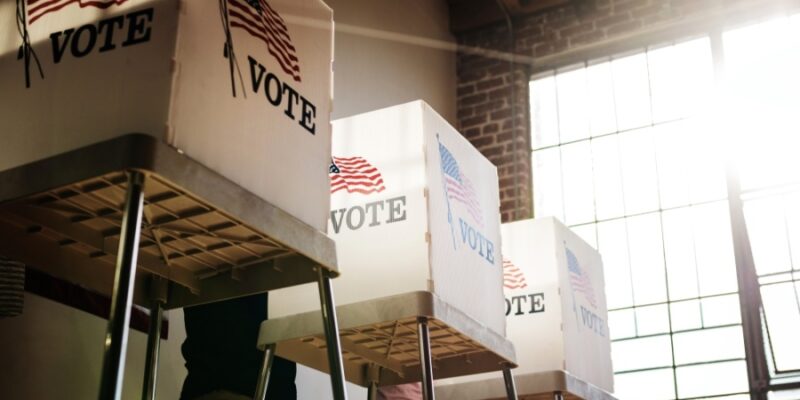An open secret among Texas election reformers came to light this week as the Republican Party of Texas Convention prepares to kickoff on Thursday.
That secret: Your ballot may not be. Almost anyone’s ballot choices in large Texas counties can be viewed, due to data breaches and simple decoding methods, a lawsuit alleges.
Matt Rinaldi, Chairman of the Texas GOP, became the most public example of a method being used to determine how one voted in the 2024 Primary. Rinaldi, who is not seeking another term but who has a preferred, allied successor, was accused of being soft on Donald Trump‘s bid to reclaim the presidency. Rinaldi has in the past voiced support for Ron DeSantis. But a recent tweet on X suggested that he voted for Trump, as convention delegates are engaged in a purity test to see which of the six candidates for party chairman are the most conservative, America First, or otherwise pro-Trump.
Not so fast, alleges the typically incendiary conservative blog Current Revolt, which published what appears to be Rinaldi’s ballot: According to it, Rinaldi voted for DeSantis.
We have obtained a copy of Chairman Matt Rinaldi’s ballot from Super Tuesday that indicates he voted for Ron Desantis and not Donald Trump. You can read how we obtained his ballot and why our elections are in crisis in the reply below (1/2) #txlege: https://t.co/CdQRMJeUH9 pic.twitter.com/Ik8fivcY7b
— Tony Ortiz (Current Revolt) (@CurrentRevolt) May 22, 2024
Rachel Hooper, Texas GOP General Counsel, called the Current Revolt story “absurd” while noting the serious implications involved with the disclosure.
“I have instructed Mr. Rinaldi not to comment in any way on these accusations as we investigate potential civil and criminal acts including defamation. I’m also calling on the Texas Attorney General to investigate any voter intimidating by a government official in the midst of our Republican primary runoff and Texas GOP convention,” Hooper said, via a press statement.
Trey Trainor, an election law attorney and former Trump White House advisor, advised earlier this week that the ability to disclose a ballot is possible, referencing a recent lawsuit (see more on that below).
Voting has not always been secret
 The assumption that a voter’s ballot choices are known only to him or her is widely viewed as a cornerstone of our constitutional republic. But for most of America’s history, from the Colonial era to the 1890s, keeping the marks on a ballot secret was viewed as impossible — a crystal ballot globe often being used as a symbol of accountable democracy in those days.
The assumption that a voter’s ballot choices are known only to him or her is widely viewed as a cornerstone of our constitutional republic. But for most of America’s history, from the Colonial era to the 1890s, keeping the marks on a ballot secret was viewed as impossible — a crystal ballot globe often being used as a symbol of accountable democracy in those days.
It was not until political philosophers such as John Stuart Mill proposed the secrecy of the ballot would serve as a check on the power of intimidating landlords on the local level and big money interests on the larger scene.
Buying votes was not uncommon before then: and those buying the votes had a way to check up on their “investments.” Secret ballots almost immediately put an end to the political machinery and local bullying that came to define the politics of the so-called Gilded Age.
Despite what media fact checking sites claim, ballots may no longer be secret due to flaws in our electronic voting system.
Lawsuit dives into the ‘breach’
Dr. Laura Pressley and fellow plaintiffs charged in Pressley v. Nelson that the Texas Secretary of State is not enforcing the law which protects ballots from prying eyes. [Ed note: This is the lawsuit that Trainor named in his comment on X, though we are told Pressley is not involved with the release of Rinaldi’s ballot.]
“[The Texas Secretary of State office’s] failures have deprived Plaintiffs and others similarly situated of their right to cast a secret ballot that is protected against fraud and have further violated the Equal Protection and Due Process clauses of the Fourteenth Amendment. These violations result not from unconstitutional election laws, but from the Defendants’ willful and systematic disregard of valid, constitutional federal and state election laws,” the suit read.
Pressley and her co-plaintiffs are not seeking a change in Texas or federal law, according to the suit, but “compliance with existing law, which
compliance is essential to securing the right to vote free from debasement and dilution.”
The Hayride readers may remember Pressley from previous coverage. She was an Austin City Council candidate who lost to liberal candidate and now-Congressman Greg Casar. However, a later court ruling seems to vindicate her position that there was tampering involved and a new election should have been called. (Yes, this would have stopped the rise of “Comrade Casar,” but that’s a whole other story). Since then, Pressley has been deeply involved in election integrity matters and leads True Texas Votes, LLP.
Advertisement
Pressley’s suit was filed in March, and a temporary restraining order request was immediately rejected by Federal Judge Robert Pittman. A jury trial has been requested. No action has been taken by the court since March.
According to Pressley, it takes three documents to determine how a voter voted. She demonstrated this on several top-ranking Williamson County officials during a recent Commissioners Court meeting (which were later redacted in public records). Fortunately, she said, the “breach” is not universal and can be fixed by adhering to existing law.
Current Revolt explained the potential size and scope of the breach:
Pressley asserts that the secrecy of around 85% of the ballots cast in Williamson County in the November 2023 election exists in a “breached” state, and by following a series of steps, almost any in-person ballot can be pulled and matched to the voter who turned it in.
According to the lawsuit, the basic components to be able to breach and decode a ballot exist in all the largest counties in Texas—including Harris, Dallas, Tarrant, Bexar, and Travis. As of February 2024, about 90% of Texas counties used the randomly assigned number system for ballot numbering rather than sequential numbering, which prevents ballot breaching.
There is also an algorithmic competent (experts we spoke to said this was likely an encryption key) for decoding the ballots, but the specific information on the algorithms/keys has been hidden to prevent everyone’s ballots from being decoded overnight. (Read entire article)
Counties have responsibility to redact
State officials have responded that counties bear the responsibility for redacting information which may identify voters with voting records.
Texas Secretary of State Jane Nelson replied this evening that casting a ballot anonymously is a right, balanced with “the need for election transparency.”
“Texas law requires county officials both to permit the public to inspect election records and to redact any personally identifiable information that can be traced to an individual’s ballot selections,” Nelson said via a press release. “Counties should neither compromise election transparency nor violate the privacy of individual voters.”
According to the release, a recent opinion from the Texas Atty. Gen. Ken Paxton upholds the protection of privacy stating counties “must redact any such personally identifiable information to protect the constitutional right to a secret ballot in Texas.”
FROM THE HIP: There’s a lot to dig through here, and we will keep an eye on this. But until then, if you live in a large county in Texas, there’s now a very certain chance that someone is keeping an eye on your voting choices — something election integrity activists have been warning for a long time.
We hope that Rinaldi’s alleged ballot is just that, and there is not such a gaping hole in our voting process as to allow political rivals to check up on each others’ votes. It appears this problem can be easily fixed at the state level, so we remain hopeful this is not a return to the pre-1890s crystal globe but a wake up call to effectively secure the electronic ballot boxes of our post-HAVA reality.
UPDATES:
(2:04 p.m.): Texas GOP response added.
(5:26 p.m.): Edits made to clarify Pressley was not involved with Trainor’s or Current Revolt’s efforts to release Rinaldi’s ballot; editorial statement added.
(7:49 p.m.) Information from Texas SOS press release added.
Advertisement
Advertisement

